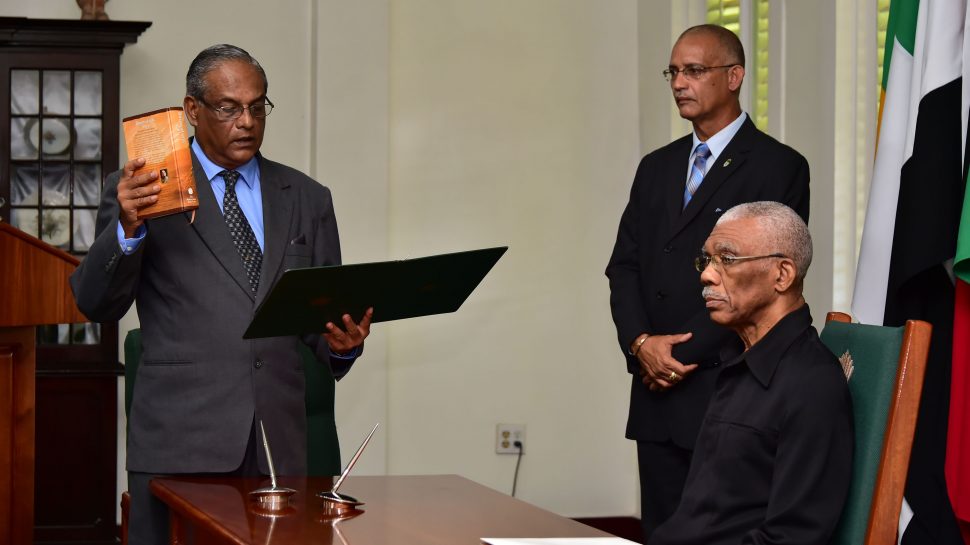President David Granger yesterday swore in retired judge, William Ramlal as the new Chairman of the Police Complaints Authority (PCA) and in stressing the importance of the body said that it is essential to ensuring that trust between the public and the police exists.
“The Authority can help to improve the level of public trust between the police and the public. The Authority is a critical link between the Police and the public. It provides a means through which the public can have its grievances against police malpractice addressed in an impartial manner by an independent person. The Authority is a public defence against the Force’s abuse of citizens’ rights. The Authority allows citizens to hold the Force’s members accountable for their actions”, he said in his remarks at a brief ceremony held at State House.
While noting that the appointment is compliant with the provisions of the laws and is consistent with the government’s commitment to increasing public trust in the Police Force, he said that the Authority can “engender greater public trust in the Force by ensuring that the Force’s actions are in conformity with respect for human rights, including the right to life and liberty – rights, which are guaranteed by the Constitution”.
Ramlal replaces former Chancellor Cecil Kennard, who was asked to step down due to his advance age, a post which has been vacant for more than a year.
The Authority which is an independent body has the power to receive “complaints of specified cases of misconduct by members of the Police Force” and to supervise “investigation of certain serious crimes alleged to have been committed by members of the Police Force.” Now that a Chairman has been appointed, the Authority can properly execute its mandate.
According to the Police Complaints Authority Act, the body shall consist of a Chairperson, to be appointed by the President from among persons who have been, who are or who are qualified to be, a Puisne judge of the High Court.
On August 30 in a statement announcing Ramlal’s imminent appointment, the Ministry of the Presidency said that the president had written to Opposition Leader Bharrat Jagdeo to inform him of his intention to appoint Ramlal, which is in keeping with Section 3 (1) of the Police Com-plaints Authority Act.
For Ramlal, his first order of business is to become acquainted with the PSC staff and this will be followed by an assessment of the amount of backlog. “There hasn’t been an authority there for a while so I expect the backlog to be humongous”, he said.
Ramlall who has given judicial service to the public for in excess of 30 years noted that as of now he is not aware of the status of the affairs of the Authority while pointing out that he has not yet visited the Brickdam location.
Granger told the small gathering which included Prime Minister Moses Nagamootoo and Minister of State Joseph Harmon, that the Authority, to effectively discharge its mandate, will be expected to exhibit the qualities of “impartiality, integrity and independence” and in so doing, it can rely on the Executive Branch for support in discharging its lawful mandate.
“The Commission’s independent status can contribute to enhancing public trust in the Force. Its powers of discipline and dismissal, applied fairly, can encourage probity and discourage misconduct”, he said adding that the existence of a Commission is not enough to guarantee that the Force would be manned by persons who are “competent, committed and uncorrupted”. It is in this regard than a PCA is important, he said.
“A Force, which is contaminated by corruption cannot safeguard the security of our citizens. Service in the Force must be based on the values of commitment, competence and incorruptibility”, he pointed out.
According to Granger, the Police Force, if it is to maintain public safety, must ensure that it enjoys public trust. “The idea of public trust arises out of the relationship between the police and the public. All politics is about people. It follows that whatever trust the people place in the police must be respected”.
He said that bribery is regarded as a notorious crime because it contributes to corruption and, thereby, undermines, public trust. “That is the reason (why) when I was asked what qualities I sought in appointing a Commissioner of Police I did not hesitate to say that he must be ‘unbribable’”, he said.
According to his curriculum vitae which was released by Ministry of the Presidency, Ramlal is a retired High Court judge, who served in that position from July, 2000 to January, 2017. He previously served in the magistracy between the years 1988 and 2000, save for a three-year period of private practice from 1989 to 1991.
He also served as a State Counsel in the Attorney General’s Chambers from 1984 to 1988; a teacher at both a private institution and in the public education system, and as a hospital administrator.
In February last year, Kennard, who had been chairman since 2002, was forced to step down by Granger because of his advanced age. At the time, he was almost 80 years old.
Many had argued that it was strange that Kennard was “forced” out of office and no arrangements were made to ensure that the post was quickly filled. President Granger has faced criticism over the decision to force Kennard to step down due to his age and then subsequently appointing Justice James Patterson, 84, to head the Guyana Elections Commission.










